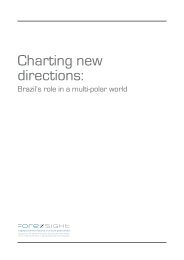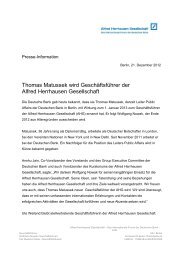India's role in a multi-polar world - Alfred Herrhausen Gesellschaft
India's role in a multi-polar world - Alfred Herrhausen Gesellschaft
India's role in a multi-polar world - Alfred Herrhausen Gesellschaft
Create successful ePaper yourself
Turn your PDF publications into a flip-book with our unique Google optimized e-Paper software.
32<br />
Through a billion voices: India’s <strong>role</strong> <strong>in</strong> a <strong>multi</strong>-<strong>polar</strong> <strong>world</strong><br />
not been the case.<br />
Trade <strong>in</strong> the eye of the storm<br />
The f<strong>in</strong>ancial crisis has affected trade through the<br />
trade credit channels. Due to liquidity shortages <strong>in</strong><br />
f<strong>in</strong>ancial markets, credit allocated to trade f<strong>in</strong>ance<br />
has been greatly reduced. The crisis has seen<br />
<strong>in</strong>creased uncerta<strong>in</strong>ty <strong>in</strong> bus<strong>in</strong>ess, lead<strong>in</strong>g to a rise <strong>in</strong><br />
the demand for letters of credit for trade. Banks have<br />
also been <strong>in</strong>creas<strong>in</strong>gly unable to guarantee f<strong>in</strong>ances<br />
for trad<strong>in</strong>g. Ow<strong>in</strong>g to the lack of trade f<strong>in</strong>ance,<br />
traders were forced to fund trade with alternative<br />
resources. High exchange rate volatility has also<br />
been a feature of the crisis – aga<strong>in</strong> <strong>in</strong>creas<strong>in</strong>g the<br />
level of uncerta<strong>in</strong>ty for firms produc<strong>in</strong>g for foreign<br />
markets. The effect of asset bubbles has also spilled<br />
over <strong>in</strong>to the manufactur<strong>in</strong>g sector. Prices of oil and<br />
metal have shot up to unsusta<strong>in</strong>able levels. As a<br />
result, prices have risen, but actual trade tak<strong>in</strong>g place<br />
<strong>in</strong> each commodity has fallen greatly. And so, all –<br />
trade f<strong>in</strong>ance, exchange rate volatility and commodity<br />
bubbles – have played a destructive <strong>role</strong> <strong>in</strong> the trade<br />
sector. These factors should subside once economies<br />
return to their normal state.<br />
However, the f<strong>in</strong>ancial crisis has resulted <strong>in</strong> severe<br />
policy distortions with<strong>in</strong> the trade sector. Therefore<br />
it is worth consider<strong>in</strong>g whether such distortions can<br />
potentially transform temporary features of the crisis<br />
<strong>in</strong>to permanent features of post-crisis economies.<br />
S<strong>in</strong>ce monetary policy was <strong>in</strong>effective <strong>in</strong> deal<strong>in</strong>g with<br />
the crisis, governments resorted to fiscal stimulus <strong>in</strong><br />
the hope of boost<strong>in</strong>g economic growth. A number<br />
of countries now believe that the external sector<br />
has been the source of much uncerta<strong>in</strong>ty and that<br />
the best way forward is to look <strong>in</strong>wards, at the<br />
domestic economy. As a result, fiscal packages have<br />
been aimed at boost<strong>in</strong>g the domestic economy and<br />
designed to avoid spillovers <strong>in</strong>to foreign markets.<br />
This has had a huge impact on the differential effects<br />
of the domestic versus the external sector. A number<br />
1 Simon J. Evenett and John Whalley 2009, VoxEU<br />
The perils of protectionism | Karan S<strong>in</strong>gh<br />
of projects now focus primarily on the domestic<br />
economy: take for <strong>in</strong>stance the focus on the green<br />
economy, where a number of countries have set aside<br />
a large proportion of their fiscal stimuli for spend<strong>in</strong>g<br />
on green projects - South Korea (81%), the EU (59%),<br />
Ch<strong>in</strong>a (38%), France (21%), Germany (13%), the US<br />
(12%), Australia (9%), Canada (8%), the UK (7%)<br />
and Spa<strong>in</strong> (6%). With regards to their green projects,<br />
these countries also discrim<strong>in</strong>ate aga<strong>in</strong>st foreign<br />
firms. 1 One example, from the recently enacted<br />
A number of countries now believe<br />
that the external sector has been the<br />
source of much uncerta<strong>in</strong>ty and that<br />
the best way forward is to look <strong>in</strong>wards,<br />
at the domestic economy<br />
US stimulus legislation, bans foreign firms from<br />
benefit<strong>in</strong>g from a <strong>multi</strong>-billion dollar appropriation for<br />
high efficiency batteries.<br />
Other conventional protectionist measures have<br />
also surged dur<strong>in</strong>g the crisis. For <strong>in</strong>stance, the<br />
number of anti-dump<strong>in</strong>g cases (both <strong>in</strong>vestigations<br />
and imposition of duties) surged <strong>in</strong> 2008 – antidump<strong>in</strong>g<br />
<strong>in</strong>itiations grew by 15 per cent and f<strong>in</strong>d<strong>in</strong>gs<br />
with imposition of duties grew by 22 per cent.<br />
Develop<strong>in</strong>g countries accounted for the majority of<br />
<strong>in</strong>itiations, though developed countries accounted for<br />
the greatest number of duty impositions. However, it<br />
is also true that a number of countries foresaw the<br />
danger of a protectionist backlash <strong>in</strong> the post-crisis<br />
period. To avoid this, G20 leaders signed a pledge on<br />
15 November 2008. Sadly, s<strong>in</strong>ce then many countries,<br />
<strong>in</strong>clud<strong>in</strong>g 17 of the G20 countries, have implemented<br />
47 measures, the effect of which is to restrict trade<br />
at the expense of other countries.<br />
Macro-level conditions have created greater








